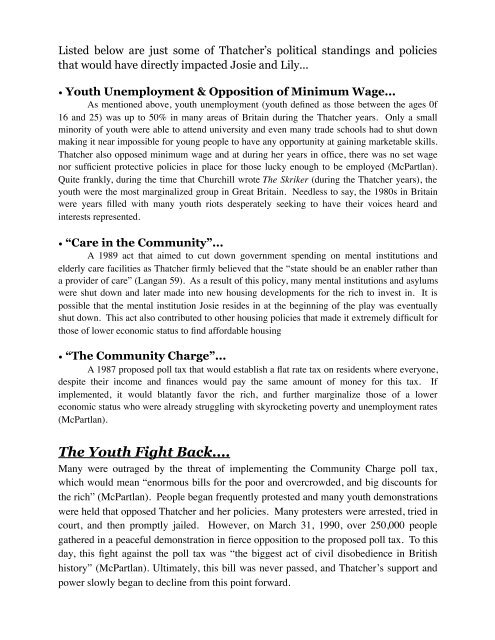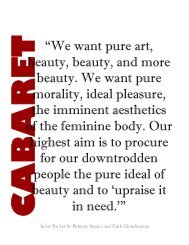The Skriker Actor Packet
The Skriker Actor Packet
The Skriker Actor Packet
You also want an ePaper? Increase the reach of your titles
YUMPU automatically turns print PDFs into web optimized ePapers that Google loves.
Listed below are just some of Thatcher’s political standings and policies<br />
that would have directly impacted Josie and Lily...<br />
• Youth Unemployment & Opposition of Minimum Wage...<br />
! As mentioned above, youth unemployment (youth defined as those between the ages 0f<br />
16 and 25) was up to 50% in many areas of Britain during the Thatcher years. Only a small<br />
minority of youth were able to attend university and even many trade schools had to shut down<br />
making it near impossible for young people to have any opportunity at gaining marketable skills.<br />
Thatcher also opposed minimum wage and at during her years in office, there was no set wage<br />
nor sufficient protective policies in place for those lucky enough to be employed (McPartlan).<br />
Quite frankly, during the time that Churchill wrote <strong>The</strong> <strong>Skriker</strong> (during the Thatcher years), the<br />
youth were the most marginalized group in Great Britain. Needless to say, the 1980s in Britain<br />
were years filled with many youth riots desperately seeking to have their voices heard and<br />
interests represented.<br />
• “Care in the Community”...<br />
! A 1989 act that aimed to cut down government spending on mental institutions and<br />
elderly care facilities as Thatcher firmly believed that the “state should be an enabler rather than<br />
a provider of care” (Langan 59). As a result of this policy, many mental institutions and asylums<br />
were shut down and later made into new housing developments for the rich to invest in. It is<br />
possible that the mental institution Josie resides in at the beginning of the play was eventually<br />
shut down. This act also contributed to other housing policies that made it extremely difficult for<br />
those of lower economic status to find affordable housing<br />
• “<strong>The</strong> Community Charge”...<br />
! A 1987 proposed poll tax that would establish a flat rate tax on residents where everyone,<br />
despite their income and finances would pay the same amount of money for this tax. If<br />
implemented, it would blatantly favor the rich, and further marginalize those of a lower<br />
economic status who were already struggling with skyrocketing poverty and unemployment rates<br />
(McPartlan).<br />
<strong>The</strong> Youth Fight Back....<br />
Many were outraged by the threat of implementing the Community Charge poll tax,<br />
which would mean “enormous bills for the poor and overcrowded, and big discounts for<br />
the rich” (McPartlan). People began frequently protested and many youth demonstrations<br />
were held that opposed Thatcher and her policies. Many protesters were arrested, tried in<br />
court, and then promptly jailed. However, on March 31, 1990, over 250,000 people<br />
gathered in a peaceful demonstration in fierce opposition to the proposed poll tax. To this<br />
day, this fight against the poll tax was “the biggest act of civil disobedience in British<br />
history” (McPartlan). Ultimately, this bill was never passed, and Thatcher’s support and<br />
power slowly began to decline from this point forward.



